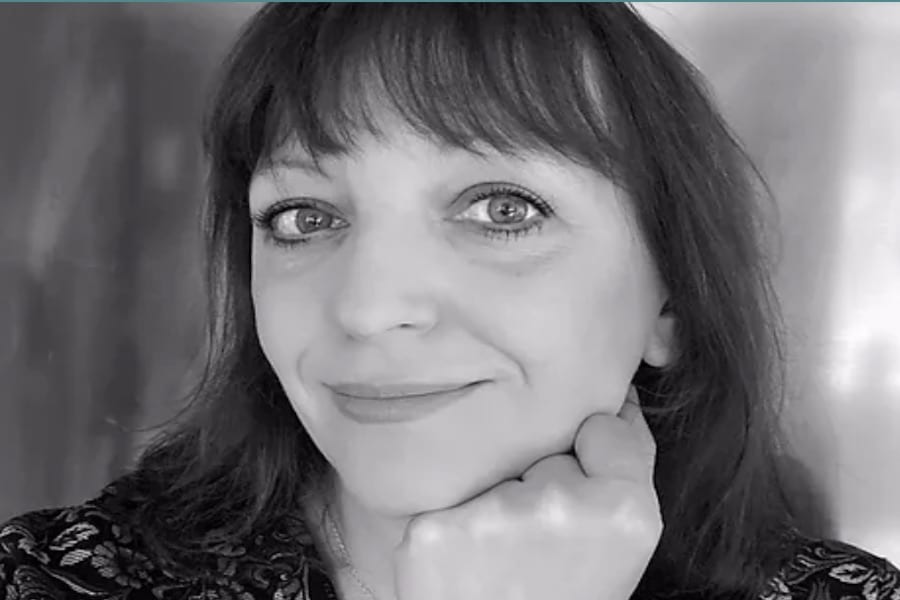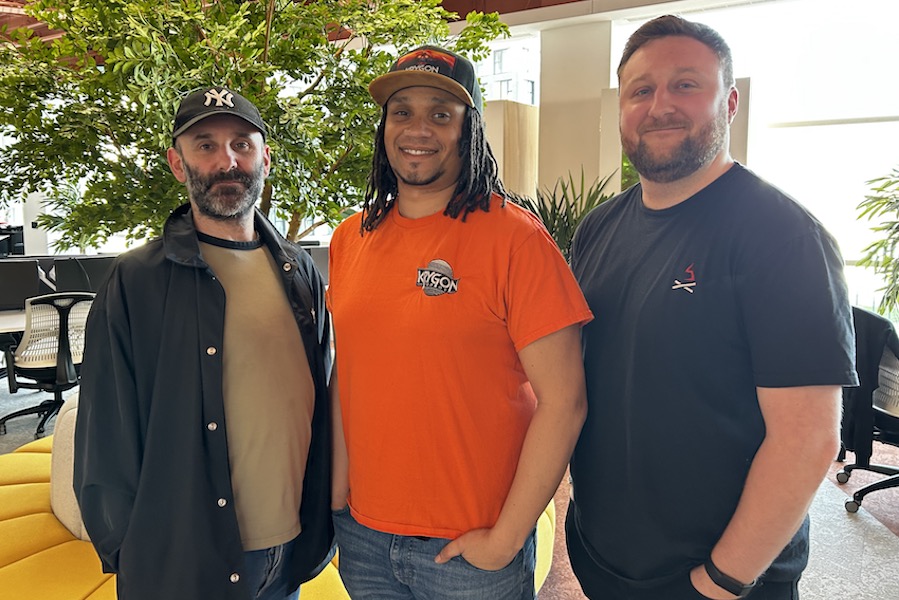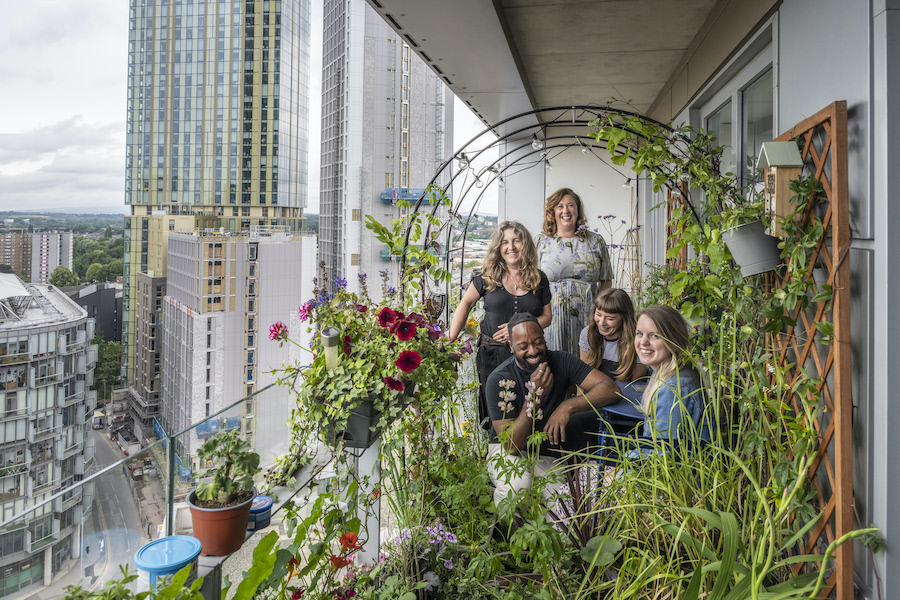Flic Everett’s Murder In The Blitz is a riveting journey through war-torn Manchester
- Written by Thom Bamford
- Last updated 2 years ago
- Books, People

Flic Everett, 53, lived in the city until ten years ago and now divides her time between Manchester and Scotland.
We sat down with the journalist turned novelist, and proud Mancunian, to delve into her latest literary endeavour.
Flic’s journey from a freelance journalist to an acclaimed novelist took a remarkable turn at the age of 52, showcasing the timeless truth that it’s never too late to chase your dreams.
Her latest release, “Murder in the Blitz,” is the inaugural entry in her Edie York mystery series, set against the evocative backdrop of wartime Manchester.
The Synopsis reads: “England, 1940. Newspaper secretary Edie York wants nothing more than to be a real wartime reporter. But when she stumbles upon the death of a Home Guard soldier she must turn her investigative skills to sleuthing…
“Rookie reporter Edie York dreams of being out in the field, instead of being stuck writing up the wartime headlines, transcribing Churchill’s rousing speeches on her cranky typewriter.
“So when her first real assignment one misty morning ends with the crack of a pistol shot and the sudden death of a Home Guard soldier, she’s determined to take her chance and investigate.
“With the local police force, under the utterly irritating but outrageously handsome DCI Louis Brennan, stretched to the limit as bombs rain down, Edie strikes out alone. And she quickly discovers more than she’d ever hoped – or feared. From undercover spies to priceless stolen artwork, Edie is plunged headlong into a mystery that stretches from Manchester to Berlin.
“But when she finds another body in the blackout, Edie realises she’s bitten off more than she can chew. With an exasperated Louis finally lending a hand, can Edie unveil the murderer and make headline news, her name in print at last? Or will she be next…?”
It has been billed as a brilliantly addictive and totally twist-packed cozy historical mystery perfect for fans of Richard Osman and Agatha Christie.
We sat down with Flic for this interview, to explore the captivating world she has crafted, discuss her writing process, and gain insights into her passion for historical storytelling.
Her Edie York series of mystery novels, set in Manchester, begins with Murder in the Blitz (Bookouture), which is out on 21st Sept.
To set the stage, could you share a bit about your background and what inspired you to become a writer, especially at the age of 52?
I’ve always been a writer. I began as a freelance journalist in 1991, working for a listings and events paper called Uptown based on Princess Street.
I had dropped out of University in Glasgow because I wanted to be a journalist.
That led to working for the Manchester Evening News, Big Issue North and then quite quickly to working for national mags and newspapers.
I had a baby in 1992, so I needed a way to earn money fast while working from home and freelance writing was the only thing I was good at.
I was never a news reporter – only ever features, so it used to annoy me greatly when people said ‘Ooh, I’d better not tell you, it’ll end up in the paper!’
I always wanted to say, ‘Only if it’s interesting, love, so I think you’re safe’.
I was the chief columnist on the M.E.N. when I was 25. I had no idea what I was doing, so I was very confident.
Those days are long gone…
Since, I’ve had several non-fiction books published, and I self-published a novel about ten years ago that did well – but it’s only recently that I’ve had the time (and scraped together enough money) to take a punt on writing novels properly, for a publisher, which is what I’ve always wanted to do.
I think a lot of novelists start when they’re older – mainly because it’s a financial risk and you need to be able to spare the time.
I don’t have the energy to do a full-time job and write novels in between and I’m in awe of anyone who does. It would kill me.
How did growing up in Manchester influence your writing and storytelling style? Are there specific aspects of the city’s culture or history that have shaped your work?
I grew up in Withington, and the city centre was a huge part of my upbringing and teenage years, so it’s all shaped me, both culturally and emotionally.
I think the most important thing about Manchester is its sense of humour.
It’s sarcastic and relentlessly sharp and witty, sometimes a bit mean (but still funny) and I wanted to get that across.
Many novels set in the past forget that people made jokes, and took the p*** out of each other – I think Manchester has always had a fantastic sense of humour, in every era.
I was also aware that the city suffered in WW2.
So many wonderful buildings were bombed including the Assizes courts, which were designed by Alfred Waterhouse and are now considered among Britain’s great ‘lost buildings.’
I spent my childhood, and my son’s childhood, visiting the Art Gallery, the Whitworth, Central Library, John Rylands Library, Manchester Museum – all these great old buildings that have shaped the cultural life of the city, and it mattered to me to reflect their importance in Mancunians’ lives.
My heroine, Edie, grew up in a children’s home, so her main education was taking herself to see famous paintings, going to the library, and being inspired by these wonderful places.
I still love them all and visit regularly.
I used to have a vintage shop (Rags to Bitches) on Tib Street in the NQ, too, and so much around there hasn’t changed at all – you can still see a painted sign that says ‘Fire Warden’s Bell’ on one door, and plenty of the old coal chutes and backyards are still intact.
I’ll be devastated when they knock it all down to make a giant fun park with neon mini-golf and six shots for a tenner.
Can you tell us more about your Edie York mystery series and the inspiration behind it? How did you come up with the character of Edie York and the wartime setting?
I started thinking about this book years ago – I wanted to write a crime story because crime is what I love reading, and I thought it would be interesting to write it from the perspective of a young woman, who’s just starting out and wants to be a crime reporter.
I was never a news journalist, always features, but my career really began in my early twenties at the Manchester Evening News, and I remember that feeling of ambition and nerves, dashing about all over the city, interviewing people.
I thought if I made her an obituarist, she’d have good access to the police and a stack of possibly mysterious deaths! It also means she has colleagues and friends, who can help her investigate.
The wartime setting worked because the books are in the ‘cosy crime’ genre (ie not forensic horror in close-up – we don’t dwell in the pathology lab) and historical settings work so well, as they echo the ‘Golden Age’ of crime writing, and allow characters not to have phones or internet, or easy ways of doing things.
And Manchester was so badly bombed in the Blitz, it added a whole new layer of drama and jeopardy – plus, I hope, some interesting bits of fairly recent history.
Your series proudly champions Northern history. What are some lesser-known aspects of Northern history that you’ve incorporated into your books? Why is it important to you to highlight this history?
I read constantly, and I love London, but I get tired of hearing about it.
The London Blitz is endlessly famous. The Manchester Blitz not so much, but it was just as traumatic and dramatic for Mancunians (and Liverpudlians – they suffered terribly in 1941).
All of this has gone into my work – you could say I’m a bit defensive about my city, but I owe it so much. Well, we all do.
I remember bits of the city which were still overgrown bomb sites in the 70s, and it’s amazing to me that the War is still within living memory – just. It feels like another world, but my late grandparents all lived through it.
My Grandma, who worked for the Observer Corps, recalled crunching to work over broken glass from the air raids, my Grandpa was in the Home Guard, and my Dad’s mum ran a grocer’s shop with her mum, and used to give poor people extra rations.
I researched a lot about the air raids, even what the weather was doing, but I also wanted to write about the problems of daily life – making butter last the week, queuing for fish, the irritation of the blackout – as well as the big stuff.
Manchester has changed so much, too, even since I was little, and I’m fascinated by how it used to be – what the shops looked like, where people ate lunch.
We also tend to forget that everybody smoked. The entire novel is wreathed in fag smoke and casual sexism, because that’s how it was. It’s ‘cosy’ crime, but it’s also important not to Disney-fy the past.
Describe your writing process. Do you have any specific rituals or habits that help you get into the writing flow?
Absolutely not. I’ve been a writer for over 30 years, and I learnt very early on that you can’t be precious about it – if writing is your job, you don’t do rituals any more than a plumber lights an incense stick and recite a poem before he unblocks a U- bend.
Like Ken’s job is beach, my job is laptop. It’s not mystical.
Having said that, I do struggle with interruptions.
I like to work in a quiet place, so I am not that writer merrily tapping away in a coffee shop. I sit in the office/spare room of the 2 bed cottage I share with my husband Andy, and I get on with writing.
Sometimes I shout ‘can you take the dogs out?’ or ‘or ‘who was that on the phone?’ or ‘why is the news on so loud, I can’t hear myself think.’
Sometimes, for a change of scene, I sit at the kitchen table which absolutely wrecks my back but is within a stroking distance of Kit Marlowe the cat in her favourite cardboard box.
I write fairly standard hours, too – as a journalist you get used to deadlines and emailing people who go home by six, so I’m not one for writing into the night. I go and start cooking my tea and we cue up an episode of Endeavour. I’m too tired to be inspired by then.
Writing a mystery novel can be complex. What were the biggest challenges you faced while writing your books, and what were the most rewarding aspects of the process?
On a writing level, plotting is the hardest thing.
I dread doing the synopsis, where you work out what needs to happen, and when, and who knows what.
But once that’s done, the writing bit is a real joy for me, because it means I can enter that world, knowing what needs to happen, and fill it all with characters and colour and dialogue.
I know some writers are ‘pantsers’ who decide what happens as they go along, but I could never do that – I’m a plotter all the way.
On a practical level, it’s always a challenge to write novels unless you’re a millionaire – as you don’t make any money till they come out! So this past year I’ve been extremely ‘re-using-tebags’ skint, but it’s all in a good cause.
The best parts are the research – I have a full bookcase of WW2 social history, you can ask me anything about rationing and communal washing facilities – and the actual writing.
I love my characters (but not enough to stop bad things happening to them) and I really enjoy the writing process and find it very immersive.
My husband is a bit unnerved by my 1000-yard stare when he comes to ask me something, and I’m mentally ordering sardines on toast at a table in the Kardomah Café in 1941.
It’s a manageable form of time travel, and I love it.
You became a published author later in life. What advice do you have for aspiring writers who may be hesitant to pursue their dreams at any age?
I don’t have any advice other than this: If you feel the urge to write, write.
It might not become a bestseller (though it might!) but if it brings you joy, it doesn’t matter.
There is no issue with ageing as a writer – most of us go on till we drop.
You can start at 50, 60, 70 or 80. You can start at 100. Don’t even think about age, just write your words.
Are there any upcoming projects or new books you’re currently working on or planning to release in the near future?
Murder in the Blitz is the start of a series starring Edie York, all set during the war.
So far, there’s another two books coming – and I’m still writing the third instalment!
What do you hope readers take away from your books, especially in terms of appreciating history and the role of strong, independent female characters like Edie York?
Well, I’m not here to educate, only to entertain. I’ve always found reading to be the best and most joyful escape imaginable, so my hope is that readers will want to spend some time with Edie and friends in the 1940 Blitz and forget about their own worries for a while.
You can pre-order this book by clicking here.
- This article was last updated 2 years ago.
- It was first published on 11 September 2023 and is subject to be updated from time to time. Please refresh or return to see the latest version.
Did we miss something? Let us know: press@ilovemanchester.com
Want to be the first to receive all the latest news stories, what’s on and events from the heart of Manchester? Sign up here.
Manchester is a successful city, but many people suffer. I Love Manchester helps raise awareness and funds to help improve the lives and prospects of people across Greater Manchester – and we can’t do it without your help. So please support us with what you can so we can continue to spread the love. Thank you in advance!
An email you’ll love. Subscribe to our newsletter to get the latest news stories delivered direct to your inbox.
Got a story worth sharing?
What’s the story? We are all ears when it comes to positive news and inspiring stories. You can send story ideas to press@ilovemanchester.com
While we can’t guarantee to publish everything, we will always consider any enquiry or idea that promotes:
- Independent new openings
- Human interest
- Not-for-profit organisations
- Community Interest Companies (CiCs) and projects
- Charities and charitable initiatives
- Affordability and offers saving people over 20%
For anything else, don’t hesitate to get in touch with us about advertorials (from £350+VAT) and advertising opportunities: advertise@ilovemanchester.com

£14.5m cultural and creative hub to ‘mark a new chapter’ for Stockport Town Centre

Now you can own a piece of TV history and support a much loved NHS Charity

The welcoming Manchester community where board games build friendships

Best bars and pubs to watch the football and live sport in Manchester

Discotheque Royale vs Piccadilly 21s: which was your favourite 90s Manchester club?















